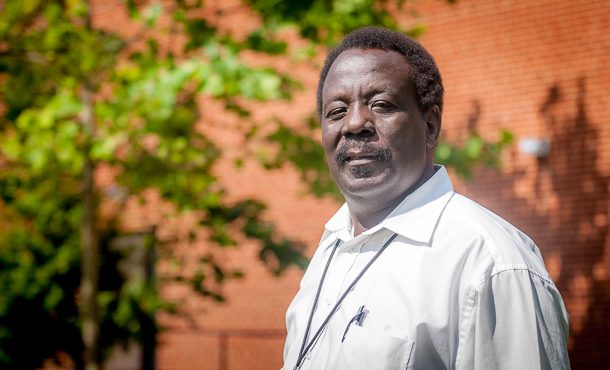Victor Dogos coordinates three interfaith peacebuilding workshops – one each for religious leaders, youth and women – in Chad every year, working with the financial and staff support from Mennonite Central Committee. This summer, he enrolled in all four sessions, approximately five weeks, of Eastern Mennonite University’s Summer Peacebuilding Institute to deepen his knowledge and improve his own skills as a peacemaker.
In a recent interview on campus, Dogos told the following story as an example of the kind of work he does: In December 2012, in the rural Chadian town of Mongo, a group of religious leaders met for an interfaith peacebuilding workshop sponsored each year by the Coalition of Evangelical Churches in Chad (known by its French acronym, EEMET). Among the roughly 30 leaders who attended – equally representing Muslims, Catholics and Protestants, Chad’s three main religious groups – were an imam and a pastor who both adhered to particularly strict, fundamentalist interpretations of their respective faiths.
As the recently hired coordinator of EEMET’s Ethics, Peace and Justice program, Dogos was responsible for the event’s logistics. In order to address potential friction between the imam and the pastor head-on, he made them roommates during the week-long workshop. On their first night together, an animated theological debate kept the two up late.
The next morning, when the imam rose early to pray, the pastor one-upped him by spending extra time with his devotions. The morning after that, the imam, determined to demonstrate his own devoutness, read the Koran until the very moment the day’s schedule began.
Later that week, the caterers were late preparing the evening meal Dogos had arranged for the participants. The imam and the pastor got too hungry to wait, and Dogos noticed them walking off to town to get something to eat together. The roommate decision had paid off. Somehow, some way, the two had bridged the gulf between their sharply divergent worldviews with mutual respect.
They still, Dogos says, maintain their improbable friendship.
Other work is impossible without peace
Dogos was in high school in N’Djamena, Chad’s capital, in 1980 when Hissène Habré’s forces were fighting against the military of the former president.
“There were three options then,” he says in a 2014 interview. “You could take up arms and fight. You could go into the villages and work in the fields, because the war was really in the city. Or you could leave Chad. I went to Ivory Coast in June 1982. It was there that I decided I would not do anything else but to serve God.”
Dogos, who speaks Arabic and has close ties to the Muslim community, says that peace is the “foundation” and the “base” for other work. “We have to understand that we cannot do any other work without peace.”
“We are living in a post-war context in Chad, but the threat of inter-ethnic violence, terrorist activity and wars from bordering nations continue to cast a dark shadow on our current fragile peace,” he wrote in his SPI application packet.
The story like the one about the imam and the pastor is one example among many, another victory for the cause of understanding in an ethnically and religiously diverse country that’s surrounded by wars and violence in neighboring ones.
‘God put us in this same country’
Prior to joining EEMET, Dogos spent 12 years as missions director for his denomination, Assemblées Evangéliques au Tchad. Dogos, who has master’s degrees in communications as well as missiology, has also been a pastor in Chad and Côte D’Ivoire. One of the assets he brings to his peacebuilding work now is the network of contacts he developed among religious leaders. He also has a deep, personal familiarity with the theology, mindset and beliefs of Chad’s Islamic community.
“God put us in this same country. Our children attend the same schools, our women go to the same shops, we share the same offices,” says Dogos. “It’s very important to live in peace.”
“The deep healing and interfaith collaboration” sparked by Dogos’ work was an inspiration to fellow SPI participant Trina Trotter Nussbaum, assistant director of EMU’s Center for Interfaith Engagement.
“Victor’s faith shines through him and the sincerity of that faith spills out onto everyone he meets,” said Nussbaum, who is also a student in the graduate program at the Center for Justice and Peacebuilding. “He not only has a deep faith in his Creator, but also that people can eventually see humanity in the other. He has a passion for wholeness and healing, and it is contagious, in the best possible way.”
